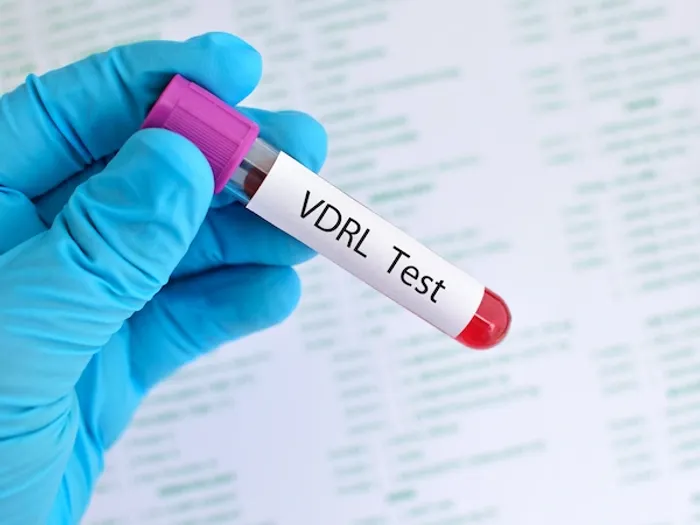VDRL Test Overview and Process
Learn about the VDRL test, its purpose, process, and significance in detecting syphilis and other related infections for early diagnosis and treatment.


If you or a loved one has been advised to take a VDRL test, you might have questions about what it is, why it’s needed, and what the process involves. This article aims to explain everything in simple terms so you can feel informed and at ease.
What is a VDRL Test?
The Venereal Disease Research Laboratory (VDRL) test is a blood test used to screen for syphilis, a sexually transmitted infection (STI) caused by the bacterium Treponema pallidum. The test checks for antibodies produced by your body in response to the infection.
While syphilis is treatable, early detection is crucial to prevent complications. The VDRL test is a common screening tool, often recommended for pregnant women, individuals with multiple sexual partners, or those showing symptoms of syphilis.
Consult a Top Specialist
Why is the VDRL Test Done?
Your doctor may recommend a VDRL test if:
- You have symptoms of syphilis (such as sores, rashes, or fever).
- You’ve had unprotected sex with a new or multiple partners.
- You’re pregnant (to prevent passing syphilis to the baby).
- You’re being treated for another STI (like HIV or gonorrhea).
- You’re required to undergo a medical check-up (e.g., for marriage or employment).
Symptoms of Syphilis
Syphilis progresses in stages, and symptoms vary:
1. Primary Stage (3-6 weeks after exposure):
- A painless sore (chancre) at the infection site (genitals, mouth, or rectum).
- The sore heals on its own, but the infection remains.
2. Secondary Stage (weeks to months later):
- Skin rashes (often on palms and soles).
- Fever, swollen lymph nodes, sore throat, and fatigue.
3. Latent Stage (no symptoms, but infection persists).
4. Tertiary Stage (years later, if untreated):
- Severe complications like heart disease, nerve damage, or blindness.
- Early detection through the VDRL test helps prevent these serious health issues.
How is the VDRL Test Performed?
The test is simple and quick:
1. Blood Sample Collection: A healthcare professional will draw a small amount of blood from your arm.
2. Lab Analysis: The sample is sent to a lab to check for syphilis antibodies.
3. Results: You’ll receive your report within a few days.
What Do the Results Mean?
- Non-reactive (Negative): No syphilis antibodies detected.
- Reactive (Positive): Antibodies are present, but further tests (like FTA-ABS or TPHA) are needed to confirm syphilis.
A false-positive can occur due to other infections (like HIV or lupus), so additional testing is often required.
How to Prepare for the Test?
- No special preparation (fasting is not needed).
- Inform your doctor about any medications you’re taking.
What If the Test is Positive?
If confirmed, syphilis is treatable with antibiotics (usually penicillin). Early treatment prevents complications. Your doctor will guide you on the next steps, including:
- Completing the full course of medication.
- Informing sexual partners (so they can get tested).
- Follow-up testing to ensure the infection is gone.
Preventing Syphilis
- Practice safe sex (use condoms).
- Get regular STI screenings if sexually active.
- Avoid sharing needles.
When to See a Doctor?
If you experience symptoms or suspect exposure to syphilis, consult a doctor immediately. Early testing and treatment are key to staying healthy.
Need a VDRL Test?
You can easily book a VDRL test through Apollo 24|7 for a hassle-free experience. Early detection ensures prompt treatment and better health outcomes.
Get Your Health Assessed
Final Thoughts
The VDRL test is a simple yet important screening tool for syphilis. If you’re at risk or experiencing symptoms, don’t hesitate to get tested. Your health matters, and timely action can make all the difference.
Consult a Top Specialist
Consult a Top Specialist

Dr. M L Ezhilarasan
General Practitioner
6 Years • MBBS
Visakhapatnam
Apollo 24|7 Clinic - Andhra Pradesh, Visakhapatnam

Dr D M Karthik
General Practitioner
4 Years • MBBS, Fellowship in Diabetes Mellitus, Advance certificate in Diabetes Mellitus, Derma Nutrition Certification
Visakhapatnam
Apollo 24|7 Clinic - Andhra Pradesh, Visakhapatnam

Dr. Suraja Nutulapati
General Physician/ Internal Medicine Specialist
10 Years • MBBS, MD (Internal Medicine)
Hyderabad
Apollo 24|7 Clinic, Hyderabad
(925+ Patients)

Dr. Jawwad Mohammed Kaleem
General Practitioner
4 Years • MBBS
Hyderabad
Apollo 24|7 Clinic, Hyderabad

Dr. Siri Nallapu
General Practitioner
5 Years • MBBS
Hyderabad
Apollo 24|7 Clinic, Hyderabad
Consult a Top Specialist

Dr. M L Ezhilarasan
General Practitioner
6 Years • MBBS
Visakhapatnam
Apollo 24|7 Clinic - Andhra Pradesh, Visakhapatnam

Dr D M Karthik
General Practitioner
4 Years • MBBS, Fellowship in Diabetes Mellitus, Advance certificate in Diabetes Mellitus, Derma Nutrition Certification
Visakhapatnam
Apollo 24|7 Clinic - Andhra Pradesh, Visakhapatnam

Dr. Suraja Nutulapati
General Physician/ Internal Medicine Specialist
10 Years • MBBS, MD (Internal Medicine)
Hyderabad
Apollo 24|7 Clinic, Hyderabad
(925+ Patients)

Dr. Jawwad Mohammed Kaleem
General Practitioner
4 Years • MBBS
Hyderabad
Apollo 24|7 Clinic, Hyderabad

Dr. Siri Nallapu
General Practitioner
5 Years • MBBS
Hyderabad
Apollo 24|7 Clinic, Hyderabad
